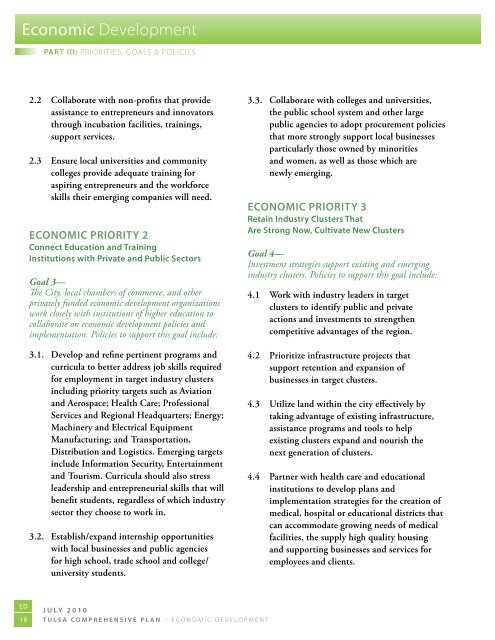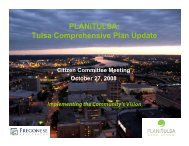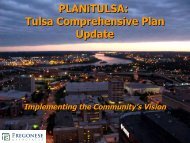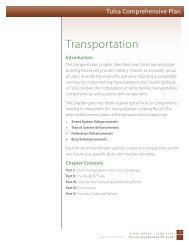Tulsa Comprehensive Plan - PLANiTULSA
Tulsa Comprehensive Plan - PLANiTULSA
Tulsa Comprehensive Plan - PLANiTULSA
You also want an ePaper? Increase the reach of your titles
YUMPU automatically turns print PDFs into web optimized ePapers that Google loves.
Economic development<br />
parT iii: pRioRitieS, GoAlS & policieS<br />
2.2 Collaborate with non-profits that provide<br />
assistance to entrepreneurs and innovators<br />
through incubation facilities, trainings,<br />
support services.<br />
2.3 Ensure local universities and community<br />
colleges provide adequate training for<br />
aspiring entrepreneurs and the workforce<br />
skills their emerging companies will need.<br />
economic prioriTy 2<br />
connect education and Training<br />
institutions with private and public sectors<br />
Goal 3—<br />
The City, local chambers of commerce, and other<br />
privately funded economic development organizations<br />
work closely with institutions of higher education to<br />
collaborate on economic development policies and<br />
implementation. Policies to support this goal include:<br />
3.1. Develop and refine pertinent programs and<br />
curricula to better address job skills required<br />
for employment in target industry clusters<br />
including priority targets such as Aviation<br />
and Aerospace; Health Care; Professional<br />
Services and Regional Headquarters; Energy;<br />
Machinery and Electrical Equipment<br />
Manufacturing; and Transportation,<br />
Distribution and Logistics. Emerging targets<br />
include Information Security, Entertainment<br />
and Tourism. Curricula should also stress<br />
leadership and entrepreneurial skills that will<br />
benefit students, regardless of which industry<br />
sector they choose to work in.<br />
3.2. Establish/expand internship opportunities<br />
with local businesses and public agencies<br />
for high school, trade school and college/<br />
university students.<br />
3.3. Collaborate with colleges and universities,<br />
the public school system and other large<br />
public agencies to adopt procurement policies<br />
that more strongly support local businesses<br />
particularly those owned by minorities<br />
and women, as well as those which are<br />
newly emerging.<br />
economic prioriTy 3<br />
retain industry clusters That<br />
are strong now, cultivate new clusters<br />
Goal 4—<br />
Investment strategies support existing and emerging<br />
industry clusters. Policies to support this goal include:<br />
4.1 Work with industry leaders in target<br />
clusters to identify public and private<br />
actions and investments to strengthen<br />
competitive advantages of the region.<br />
4.2 Prioritize infrastructure projects that<br />
support retention and expansion of<br />
businesses in target clusters.<br />
4.3 Utilize land within the city effectively by<br />
taking advantage of existing infrastructure,<br />
assistance programs and tools to help<br />
existing clusters expand and nourish the<br />
next generation of clusters.<br />
4.4 Partner with health care and educational<br />
institutions to develop plans and<br />
implementation strategies for the creation of<br />
medical, hospital or educational districts that<br />
can accommodate growing needs of medical<br />
facilities, the supply high quality housing<br />
and supporting businesses and services for<br />
employees and clients.<br />
ED<br />
18<br />
July 2010<br />
<strong>Tulsa</strong> comprehensive plan – economic development













